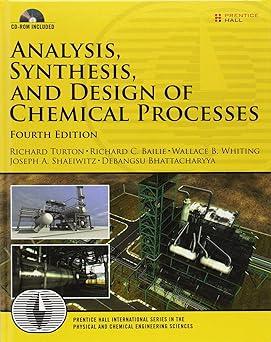In the production of acrylic acid, the final step is distillation of an acrylic acid/acetic acid mixture.
Question:
In the production of acrylic acid, the final step is distillation of an acrylic acid/acetic acid mixture. The acrylic acid, which is the bottoms product, may not exceed \(90^{\circ} \mathrm{C}\) due to spontaneous polymerization above that temperature. Both the acrylic acid and the acetic acid may be considered pure at the bottom and the top of the column, respectively.
In the current design, a vacuum column with low-pressure-drop, structured packing is used. The pressure drop in the column is \(9.5 \mathrm{kPa}\). The reboiler uses low-pressure steam, but the reboiler feed is equipped with a desuperheater, so the steam temperature is \(120^{\circ} \mathrm{C}\). There is a control system designed to maintain the temperature difference between the boiling acrylic acid and the steam constant by varying the desuperheater settings. The acrylic acid is reboiled at \(89^{\circ} \mathrm{C}\). In the condenser, the current design is for cooling water entering at \(30^{\circ} \mathrm{C}\) and leaving at \(40^{\circ} \mathrm{C}\).
a. What is the pressure at the bottom of the column?
b. What is the temperature of the condensing acetic acid at the top of the column?
c. Based on customer complaints, it is believed that the product is off spec. Investigation shows that the cooling water is flowing at the design rate and that the heat load on the condenser is at design specifications. However, due to a heat wave, the cooling water appears to be entering at \(35^{\circ} \mathrm{C}\). Could this explain the off-spec product? Support your argument with calculations. What else in the column (temperatures, pressures, etc.) must have changed? What are these new values? Comment on the reboiler control strategy.
Vapor pressure data:
For acrylic acid: \(\ln P^{*}(k P a)=17.31-\frac{5264.4}{T(K)}\)
For acetic acid: \(\ln P^{*}(k P a)=17.54-\frac{4981.5}{T(K)}\)
Step by Step Answer:

Analysis Synthesis And Design Of Chemical Processes
ISBN: 9780132618120
4th Edition
Authors: Richard Turton, Richard C. Bailie, Wallace B. Whiting, Joseph A. Shaeiwitz, Debangsu Bhattacharyya





